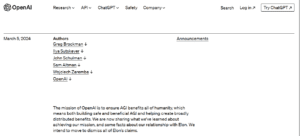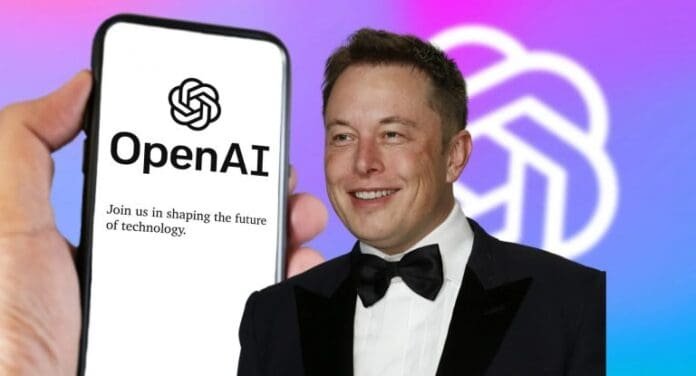On Wednesday, the most valuable AI startup, OpenAI, announced its intention to reject all allegations leveled by Elon Musk in its most recent lawsuit. The company claimed that Musk, who participated in its co-founding, had little to no influence over its growth and success.
A blog post written by Greg Brockman, Sam Altman, John Schulman, Ilya Sutskever, Wojciech Zaremba, and OpenAI—the whole OpenAI band—unveiled that the startup, which Microsoft backed, had raised less than $45 million from Musk since its start in 2015, even though Musk had initially promised to give as much as $1 billion in funding. The startup announced that it had raised over $90 million from various donors to fund its research.

Musk sued OpenAI, Altman, Brockman, and the firm last week, claiming that the ChatGPT maker had violated its original contracts by focusing on profits rather than the nonprofit’s original goal of developing AI for the benefit of humanity. OpenAI has now responded to Musk’s lawsuit. Musk said that the goal of OpenAI’s founding was to create an alternative to Google.
In the lawsuit, Musk claimed that OpenAI had shifted its focus from making technology “freely available” to the public as required by its founding agreement to maximize profits for Microsoft.
The future of artificial intelligence may be profoundly affected by the high-stakes legal dispute between Musk and OpenAI. Following ChatGPT’s public release in late 2022, OpenAI—the most valuable AI startup with an estimated value of over $80 billion—became the catalyst for a previously unseen AI arms race. What happens in this lawsuit could have far-reaching consequences for the industry’s power dynamics, the speed of AI development, and other important factors.
In a blog post published earlier today, OpenAI made the bold claim that the enormous computing resources needed to create artificial general intelligence (AGI)—an AI system with intelligence comparable to or greater than that of a human—would cost billions of dollars per year. Because of this insight, it became clear that changing to a profit-making structure was crucial to attracting the necessary capital and other resources.

The blog post by OpenAI details five email exchanges between Musk and executives at OpenAI, and it states that this is when disagreements began among Musk and other co-founders of OpenAI.
OpenAI stated that they were discussing a for-profit structure to advance the mission, but Elon insisted that we merge with Tesla or give him complete control. Elon resigned from OpenAI, claiming he would create a legitimate rival to Google and DeepMind. “He said he’d be supportive of us finding our own path.”
OpenAI stated, “In early February 2018, Elon forwarded us an email suggesting that OpenAI should ‘attach to Tesla as its cash cow’, commenting that it was ‘exactly right… Tesla is the only path that could even hope to hold a candle to Google’“
On Wednesday, OpenAI reaffirmed its mission to create safe and useful AGI and promote broad accessibility to its tools in order to guarantee that AGI serves all of humanity. According to the startup’s press release, OpenAI’s technology is helping people in countries like India and Kenya lead more independent lives.
“We’re sad that it’s come to this with someone whom we’ve deeply admired — someone who inspired us to aim higher, then told us we would fail, started a competitor, and then sued us when we started making meaningful progress towards OpenAI’s mission without him,” OpenAI stated in the blog post.
The Microsoft-backed startup OpenAI reacted to Musk’s claim that it had abandoned its open-source principles by stressing that, as the company made great strides in developing AGI, Musk had been aware of and consented to the eventual departure from total transparency.
“Elon understood the mission did not imply open-sourcing AGI. As Ilya told Elon: ‘As we get closer to building AI, it will make sense to start being less open. The Open in openAI means that everyone should benefit from the fruits of AI after it’s built, but it’s OK to not share the science…’, to which Elon replied: ‘Yup’.”




